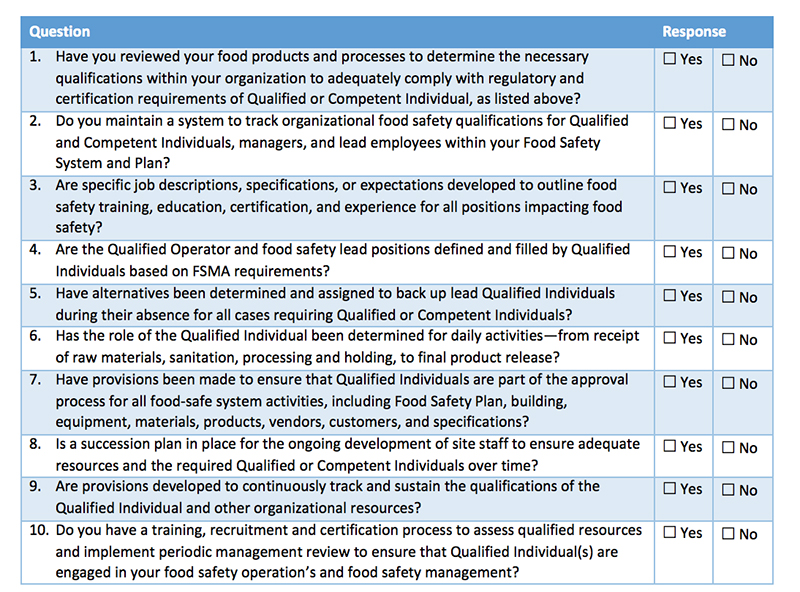A recent study of more than 100 food processing customers of food contract laboratories examined the key factors that make a commercial food laboratory competitive in the eyes of their customers. The details of this study, which was conducted by Strategic Consulting, will be presented at the Food Safety Consortium in December.
The 2016 Food Safety Consortium takes place December 5–9 in Schaumburg, IL | LEARN MOREThe volume of microbiology testing worldwide is growing annually at 6%. The study data, however, shows that the growth of microbiology testing at food contract labs is growing at twice that rate—12%—annually. This means that every year food contract labs are taking a larger share of the micro-testing market. Specific to pathogen testing, the situation is more pronounced. Two-thirds of the food processors surveyed conduct routine microbiology testing at their in-house lab, but the number willing to conduct pathogen analysis in-house has dropped to one-third. With more and more companies becoming wary about the risks and costs of analyzing pathogens in a plant lab, outsourcing continues to grow and the volume of total pathogen tests conducted at food contract labs is growing at more than 13% per year. Based on the data generated from the study, it can be deduced that, for the first time in the United States, the number of pathogen tests conducted at food contract labs now exceeds 50% of all pathogen tests conducted in the country. This is not only changing the face of microbiology testing, but it is also creating a very competitive market for laboratory services.
With this test volume now going to food contract laboratories, anyone who needs microbiology analysis has already (at least once) checked the qualifications of a food contract laboratory and validated that it has the right scope of accreditations, specific experience with product type, and proof that they can reliably meet test specifications and detection limits.
These basic qualifications, however, are “table stakes” in today’s highly competitive food safety contract laboratory market.
In the study, the most common answers to the question of the top decision criteria used when selecting a food contract laboratory for microbiology testing were, in order of importance, price, turnaround time, and dependability. When asked about testing of pathogens, most respondents reported that “accreditations” was their number one decision criteria, followed in order by the three previous factors of price, turnaround time and dependability.
A key distinction to understand in this analysis is the term “accreditations” was certainly used to describe formal lab accreditations, but it was also commonly used interchangeably with “expertise.” In detailed conversations with buyers, it was clear that specialization and competence in pathogen testing was of primary importance and, in many cases, specific experience with the specific pathogen in which they were interested, and in most cases, experience with their specific product type (e.g., meat, dairy, processed foods, etc.).
Interestingly, although proximity to the plant ranked last of the six most common selection criteria, greater than 70% of the plant personnel interviewed reported that they use a food contract lab for pathogen testing that is within 100 miles of their production location. Based on the interviews it was clear that proximity was very important (and linked to turnaround time), but it also revealed that all of the major customers reported that all of the labs they would even consider had locations within a 100-mile radius of their plant. Of these labs, 60% offered a courier service to collect samples at the plant and deliver them to the lab. It is clear that proximity and a sample collection service, while once a point of differentiation, is now seen less as key selection criteria and more of a “table stake” for being considered at all.
Food processors, of course, run samples for testing for parameters other than microbiology. In this study, 78% of the companies surveyed ran tests for nutritional chemistry and, of those, 42% used an in-plant lab. In addition, 81% of the companies test for contaminants (e.g., pesticides, drug residues, metals) and of those, 55% run the tests in an in-plant lab. Of the companies that use a food contract lab for either types of tests, 60–65% (depending on the parameter) report sending samples to a lab that is more than 100 miles from their plant.
It is clear from this data that food processors are far more comfortable analyzing samples for nutritional parameters, contaminants and routine microbiology in an in-plant lab, but fewer are comfortable running pathogen tests in-plant. And while proximity is important for pathogen tests, it was not a top qualifier for nutritional or contaminant testing. As more and more pathogen samples are outsourced to food contract labs, however, it remains to be seen if the samples will “drag” samples for these other parameters along with them to the closer proximate labs. But it is clear that the contract labs with a network of locations that place them close to their customer’s locations and who have expertise in pathogens as well as a full range of other analyses will likely have an advantage.
The role of food contract laboratories will continue to grow, creating great business opportunities. The dynamics of this market, however, are clearly changing the ground rules and presenting companies with new risks and opportunities. Understanding this changing landscape will be of paramount importance to food contract labs, and their success or failure will depend on their strategic decisions and how well they navigate these changing conditions.
These business environment changes are also essential for food processors to understand. As market conditions change, pricing, turnaround times, and add-on services available from food contract labs will also change, presenting risks and opportunities for processors. Food processors that understand these changes will also be able to take advantage and improve their testing programs.

























